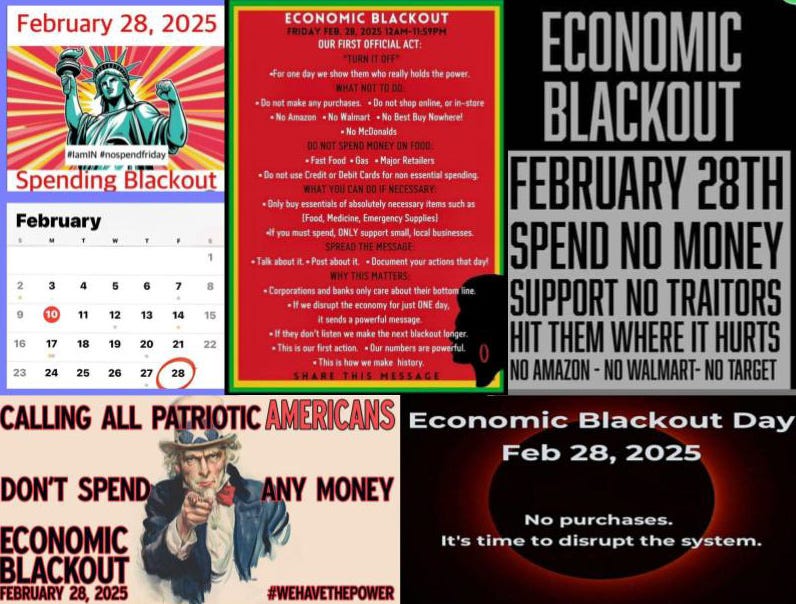The idea is simple; don’t spend any money for 24 hours. If you do have to spend money, keep it small and local–no box stores. AND it’s best not to spend money with the people who claim credit for the idea.
Normally, calls on social media for nationwide political protests are taken for what they are, keyboard warriors with a hero complex aiming for their 15 minutes of fame. Or worse, they’re accelerationists engaging in stochastic terror fantasies.
Generally these wannabe leaders exhibit no clue as to what the logistics for their call to action would require. More often than not, they would benefit from a basic ‘how government works’ civics course. So they get ignored.
These times are different, for sure. Given the complicity of Democrats generally, corporate enterprises, and most of the pundit class with MAGA, a call for a nationwide economic blackout on Friday, February 28 has struck a chord.
It has inspired many meme artists and internet lurkers looking for attention on social media. A few bigger names have announced support for the idea.
February 28 Boycott? No problem for me personally. It’s always a good day not to spend money if you are fortunate enough to have it.
The bad news: Two individual(s) and two organizations claiming credit for the February 28 Economic Blackout idea are not worthy.
The People Union: infrastructure amounts to a very unfinished website. Founder is Sam Metry, who’s bio is “coming soon.” A search on the photo turns up nothing. Ugh.
The People’s Union has a slicker website and a Go Fund Me, which has raised $44,000 as of Thursday morning. The founder of this group, John Schwartz, is a real person (I think) being interviewed in media reports about the economic blackout. Unfortunately, there is no there there when it comes to the actual organization. It’s still “in formation,” we’re told, as if another organization is really what’s needed at this time.
Somebody is also posting copies of a flyer suggesting the historian Heather Cox Richardson has some sort of involvement. She has let it be known that this claim is false.
Let me be clear, as a grassroots effort, the Feb 28 Economic Boycott is an idea whose time has come. The more people who go all-in, the better it will be. Nobody needs to claim credit except all of us who participate.
Will Dear Leader and his minions go away because of it? Nope. But people will get an inkling of where their true power can come from. Let this be a warning for the lily-livered Congressional Democrats (with their 28% approval rating) that the time for minding manners is over.
People are desperate for something to do, and I’ll be glad to have participated in not spending money for a day, recognizing that my privilege allows me to do such a thing.
***
I think most of us will agree that Elon Musk is [insert favorite swear word], but did you know he’s a shakedown artist? Check out this from the Wall Street Journal.
The women who made America’s microchips and the children who paid for it by Justine Calma at The Verge
For some time, miscarriages associated with the chip manufacturing industry were well documented in research papers. The risks discovered by scientists prompted companies to pledge to stop using certain chemicals — at least in the United States. After that, though, the industry did an about-face on transparency with researchers. As personnel data dried up, it became harder to show adverse reproductive health outcomes among employees on paper, even as many parents said their kids were living with the consequences.
US-based research into these health risks slowed down as semiconductor manufacturing moved to Asia in the 1980s. But with the new push to revive chip manufacturing in the US, these concerns are bubbling back up to the surface. In recent years, as diplomatic relations with China have deteriorated, and with the AI arms race continuing to accelerate, the Biden administration poured billions of dollars into subsidizing a domestic chip industry. Now, unions and health and environmental advocates are once again fighting to protect workers to make sure that Silicon Valley’s toxic history doesn’t repeat itself.
“Now looking back I mean, it just gets me so so upset. I understand they have to make money,” Yvette tells The Verge, “but not at the cost of another person.”
***
Americans Are Heading for the Exits by Alaric DeArment at The New Republic
On February 8, German newsmagazine Der Spiegel reported that the Max Planck Society—one of the world’s top scientific research institutions—is experiencing an uptick in applications from American scientists. Its president said the society regards the U.S. as “a new talent pool” at a time when the Trump administration seeks to cut billions in funding to the National Institutes of Health. There’s a deep historical irony in these recent developments: During the Third Reich, it was the Max Planck Society—then known as the Kaiser Wilhelm Society—that lost its best and brightest to the U.S. and other countries, including Albert Einstein.
A day prior, Irish broadcaster RTÉ reported that Ireland’s Department of Foreign Affairs has seen a 50 percent increase in the number of Americans seeking Irish passports, with some people specifically citing the new administration as a reason. Searches for terms like “dual citizenship” and “jus sanguinis” likewise saw significant spikes on Election Day and Inauguration Day, according to Google Trends. And a representative of Polaron, an Australian company that helps people obtain European citizenship by descent, told me that her firm has also “seen a steep increase in Americans wishing to leave their country, with many more keen to use their EU passport as a plan B.”
Some of the people who worked so hard to establish a new home in the U.S. as refugees are now desperate to get back out: The Guardian reported that Canadian police apprehended more than a dozen people from Venezuela, the Middle East, and Africa trying to cross the border in dangerously cold temperatures without proper clothing, as the Trump administration revoked humanitarian parole for Venezuelans, Haitians, and others, but threw open the door for white South African “refugees.”
***
“They’re Scared Shitless”: The Threat of Political Violence Informing Trump’s Grip on Congress by Gabe Sherman at Vanity Fair
January 6 further catalyzed GOP fear of Trump-inspired violence. Romney told his biographer, McKay Coppins, that an undercurrent of anxiety thwarted Republican efforts to formally punish Trump for his role in inciting the riot. “One Republican congressman confided to Romney that he wanted to vote for Trump’s second impeachment, but chose not to out of fear for his family’s safety,” Coppins wrote in his book. “When one senator, a member of leadership, said he was leaning toward voting to convict, the others urged him to reconsider. You can’t do that, Romney recalled someone saying. Think of your personal safety, said another. Think of your children. The senator eventually decided they were right.”
Former Wyoming representative and prominent anti-Trump Republican Liz Cheney told CNN that House GOP members confided to her that they were “afraid for their own security—afraid, in some instances, for their lives.” Representative Jason Crow of Colorado told NBC News after January 6: “I had a lot of conversations with my Republican colleagues last night, and a couple of them broke down in tears—saying that they are afraid for their lives if they vote for this impeachment.”
Republican Peter Meijer, then a Michigan representative, told Atlantic writer Tim Alberta in 2021 that one colleague seemed to nearly have a nervous breakdown over fears of being harmed by MAGA supporters if he were to vote to certify the 2020 election results: “He asked his new colleague if he was okay,” Alberta reported. “The member responded that he was not; that no matter his belief in the legitimacy of the election, he could no longer vote to certify the results, because he feared for his family’s safety. ‘Remember, this wasn’t a hypothetical. You were casting that vote after seeing with your own two eyes what some of these people are capable of,’ Meijer says. ‘If they’re willing to come after you inside the US Capitol, what will they do when you’re at home with your kids?’”








I am confused as to how this will work; a one day boycott, followed the next day by normal consumerism (PLUS everything not purchased the day before)? How does this impact corporations? Especially if they make up for all the lost spending on March 1?
We need SUSTAINED disruptions. Like never buy a Tesla, don’t just wait until March 1 to buy one.